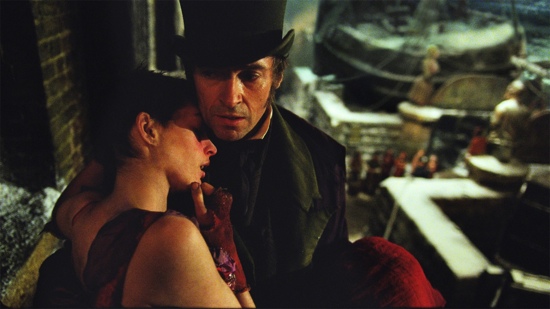I’ve read a lot of novels, and I’ve heard that Les Misérables is the best. I hadn’t read it, and I didn’t believe it. After seeing Les Misérables, I’m starting to.
The film is based on the musical, but its chief accomplishment is adapting the depth and breadth of an immense work. Like the best of Dickens’, Tolstoy’s, and Dostoevsky’s plots, Victor Hugo’s were thought experiments, taking an archaic or cancerous institution and following it through to the logical and often tragic conclusion. Jean Valean steals a loaf of bread and is imprisoned for 19 years.
Upon release, he must carry the past with him in his release papers, so that no man will give him work. Destitute, his last resort is to rob a church of its silver, and only through the uncommon kindness of its priest is he granted a new life. But it is threatened. Valjean has torn up his papers and in doing so risks life imprisonment — a man’s life extinguished for a mere legal technicality. Years later he becomes a successful businessman, where the unfortunate Fantine is employed, but by chance he is reintroduced to Inspector Javert, the man who oversaw his imprisonment and now dedicates his life to hunting Valjean.
Fantine is dismissed from work due to her busybody coworkers. She cannot find employment elsewhere because she is an unwed mother, and her daughter Cosette is left in the care of the Thénardiers, an unscrupulous couple who mistreat her and pester Fantine for money. Fantine sells her hair and teeth and finally her body. There’s no escape from her abyss. Only Jean Valjean takes pity on her because he suffers a similar stigma, but, by then, it is too late.
Inspector Javert upholds a moral code so strict that not even he can live by it. His crusade against Jean Valjean is based purely on a technicality and his own misconception that the criminal must be punished rather than reformed. Though he has a sense of fairness, the world is only black and only white, and his realization that it is not destroys him.
Marius, the student revolutionary becomes the focus in the second half, fed by dreams and passion so lofty he does not notice the world around him nor the people who care for him. His fight for change is too large in scope, and costs his friends and those who love him their lives. He denies his privileges but is ultimately saved by compassion, not bloodshed.
These are the elements of melodrama, as every fate is predetermined and crafted to appeal to our deepest emotions. Naturally this is perfect material for the musical, striving to pin each smile higher and suck the tears straight from your eyes. Claude-Michel Schönberg, Alain Boublil, and Herbert Kretzmer succeed in maintaining the balance laid out by Hugo with some most excellent songs and performed with sincerity.
Among its many assets is Les Misérables‘ fantastic cast. Yes, Russell Crowe sings like he has a cold, but his characterization echoes an older, wiser Bud White from LA Confidential and is a perfect fit. Hugh Jackman’s Jean Valjean and Anne Hathaway’s Fantine reveal talents I never knew they had. Despite the fanfare, the humanity beneath is convincing, from the way Crowe’s sneer sinks into a frown to Jackman’s effortless transition from anger one moment to despair the next. Hathaway has the shortest time on screen of the major stars, the swiftest downfall, and the saddest fate. She nails it like Jesus to the cross.
Amanda Seyfried and newcomer Eddie Redmayne as Cosette and Marius, are good but don’t stand out. Granted they’re in only a third of the film, but then Hathaway has even less time and leaves an indelible mark. On the other hand Samantha Barks (who, along with Redmayne, has played the role on stage) as Éponine is so strong you wonder what she sees in Marius (what kind of nut walks into a barber shop and says, “Give me the Kierkegaard”?).
Sacha Baron Cohen and Helena Bonham Carter as the Thénardiers provide the show-stopper “Master of the House,” whose choreography would upstage the song were it not for Hooper’s direction. The actions such as filching the customers’ wallets and storing the booty in their hair or watering down the wine with urine are clever touches, as is the progressively more overt thefts, but Hooper can’t quite keep the pace, jerking back and forth and swooping up and down. It still works, but it can be disorienting. And while they’re very funny, when Cohen and Carter mix with the rest of the cast the tone is jarring, particularly in one of the final scenes.
There’s a sense here that Hooper’s reacting to criticism of his previous film The King’s Speech in that it lacked ambition. Certainly Les Misérables is ambitious, and despite its flaws, it’s a considerable achievement. But again so much of it is already in place that you could put a camera in front and come out with a good flick. Hooper doesn’t do that, of course, but some of his choices don’t fare well. The opening scene is more bombastic than grand, and several touches such as the shreds of Jean Valjean’s papers are nothing new. Yes, this is melodrama, which thrives on exaggeration, though not cliché. Similarly, the morose blues are appropriate, but only because it’s the standard.
There will always be faults, but the strengths lift up the weaknesses. Les Misérables is not the best musical ever filmed, but it nonetheless is deeply satisfying.

